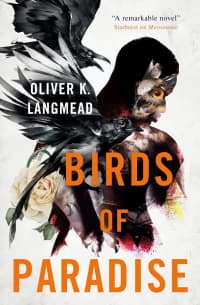
Birds of Paradise by Oliver K. Langmead
(Titan Books, 2021)
Reviewed by Jamie Mollart
Adam, the first man, still walks the earth, having lived multiple lives and now he resides in a 21st century America that is oblivious to him. He’s a forgotten man, present at key moments in history, but pivotal in none. The animals of Eden have taken human form and Eve is nowhere to be seen. Parts of Eden are cropping up on Earth, and with the help of Magpie, Crow, Owl, Pig and Butterfly, he sets about retrieving them.
I began reading with a real sense of excitement, this is an awesome concept, which will draw inevitable comparison to Neil Gaiman’s ‘American Gods’. It’s a big comparison to make and one only the very best of books will be able to live up to.
So, does Birds of Paradise?
Yes and no.
It’s a strange book, effectively two novels in one. One half is gentle and contemplative, a dreamlike consideration on the place of humankind on the planet and our relationship with nature. It’s considered, clever and crafted with beautifully poetic language.
The other half is a violent thriller as Adam and the animals make battle with a vicious millionaire for the lost Eden, and doesn’t work as well for me.
In many ways it’s a shame it’s compared to American Gods as it doesn’t have the emotional depth and complexity of Gaiman’s masterwork. It’s an interesting concept which ultimately is not played out in a completely satisfying way because of the dual nature of the plot. Reading it I got the sense he wanted to write something considered and slow burn but brought elements of heist and thriller in to liven the pace up, leaving the feeling of a longer book trimmed down.
Where it works it really works; the discussion on the human relationship with nature and our place in the world is wonderful, based as it is around ‘Genesis, 1:28: And God blessed them, and God said unto them, Be fruitful, and multiply, and replenish the earth, and subdue it: and have dominion over the fish of the sea, and over the fowl of the air, and over every living thing that moveth upon the earth.
But the road trip to find the missing parts of Eden lacks tension and character motivations; the animals, while conceptually strong, are too one dimensional and feel like a missed opportunity. This is exacerbated by a lack of real danger or a tangible enemy threat. On paper Sinclair should be a worthy adversary—a malicious old man who believes he is entitled to Eden because of his wealth and position—but despite all of his money, troops and hunting dogs, you never get the sense he could actually hurt Adam or the animals.
Where the novel really shines is in its ideas. There’s joyous invention at play here beyond the overall concept of the novel. Rook’s law firm called Corvid and Corvid; Magpie frittering away Rooks money; Butterly and Pig taking a barge holiday together; the greenhouse built by Sinclair, to house the stolen parts of Eden; the violence of Owl; the list could go on. This is a high concept novel bristling with ideas, and this is its strength.
On the flip side I struggled with is how unlikeable Adam is. He’s nasty, brutish and simple, which given he was the beginning of our horrible race may well be the point, but it makes it difficult to care about him. Eve being present would probably have softened his persona somewhat, but she is overly conspicuous from the novel, giving it a hard centre which is difficult to sympathise with.
Ultimately, I loved and was frustrated by this novel in equal measures. When I think back of it is with a sense of potentiality rather than actuality—in the same way Adam thinks of the race he sired.
Review from BSFA Review 15 - Download your copy here.
